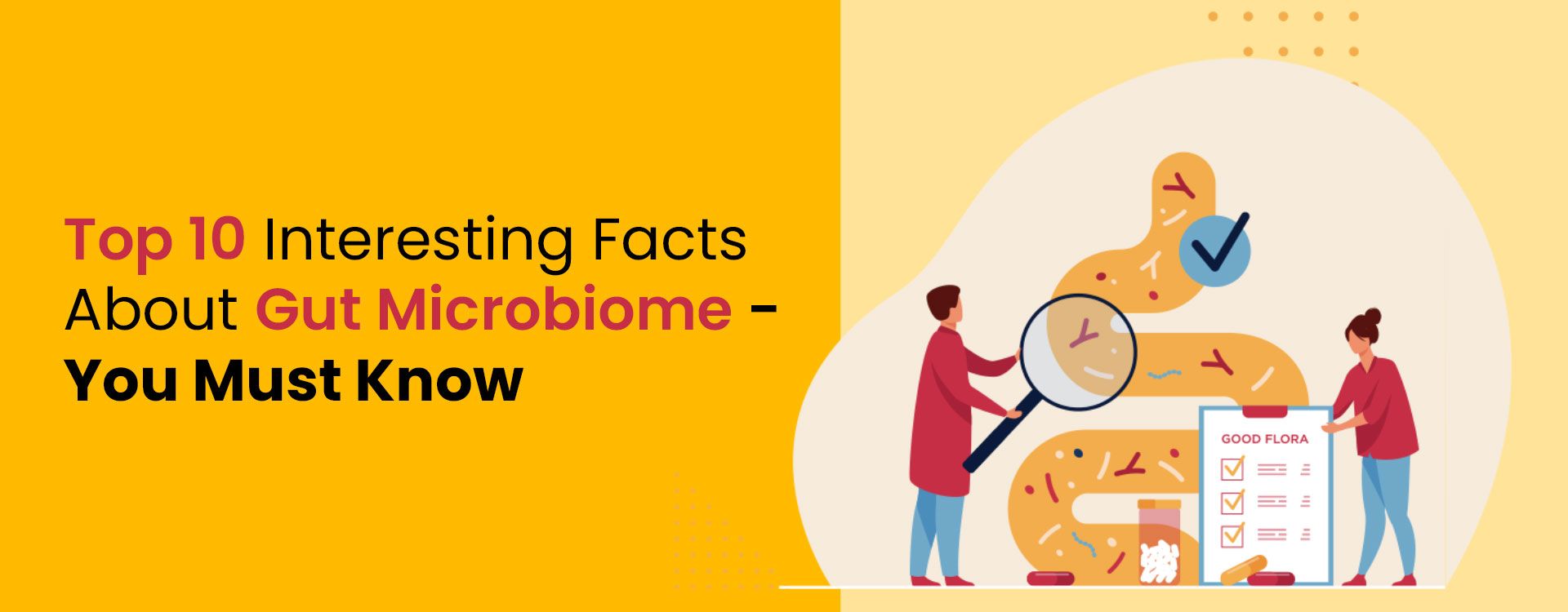- Your cart is empty
- Continue Shopping
The 10 Interesting Facts About Gut Microbiome – You Must Know
- Gut Microbiome
- Posted on
-
by Dr. Ruhi Agarwala

There are uncountable microbes present in the intestines. These microbes are mainly located in the cecum of the large intestines, and are known as gut microbiome.
Did you know?
The gut microbiome was called the Microflora of the Gut. Let us discuss some more interesting facts about the Gut Microbiome that cannot be ignored.
- The gut microbiome is more than just bacteria- It has eukaryotes and prokaryotes. Eukaryotes include fungi, and prokaryotes are bacteria. Other than these two, our gut is also a house of methanogens. All these microorganisms play different roles in our bodies. Some of these are helpful, like probiotics, while others are linked to diseases. Maintaining a balance of microbiomes in our bodies is important for healthy functioning.
- Gut microbiome changes with time- Your gut microbiome also diversifies and evolves. During your growth stage, the microbiome strengthens, and in your old age, there is a decline in these microbiomes. This results in diseases that are generally seen in older ages. But today, we see younger age group being affected as well. The reasons are lifestyle choices.
- Increase in weight due to gut microbiome- The imbalance between the healthy and unhealthy microbes in your gut can increase your weight. Scientists conducted a study on identical twins, where one was healthy, and the other was obese. The microbiome from the twin was transferred to mice. The mice which had received microbiome from the obese twin gained more weight. This shows how microbiome dysbiosis may play a role in weight gain. On the other hand, probiotics can help you to become healthy and reduce weight.
- The gut microbiome impacts your brain health- The gut microbiome can play an important role in your brain health. Neurotransmitters are crucial for your brain’s health. Serotonin is one such neurotransmitter that is made in the gut. It also affects brain health by producing brain chemicals. Probiotics can help in decreasing the chances of depression.
- Probiotics can help you with diabetes- You can control your diabetes or the chances of getting diabetes with the Gut microbiome. It plays an important role in improving insulin resistance, which is the main reason for diabetes. According to a study, the number of unhealthy microbes increased before the onset of diabetes. Even when people are taking the same diet, their blood sugar levels can vary to a large extent because of these microbes.
- A good diet for a good gut- Diet plays an important role in the gut microbiome. Eat a good and diverse range of food , as it will help to maintain a diverse microbiome, which will improve your gut health. For example, Lactobacillus from fermented foods like yoghurt can help you reduce the disease-causing microorganisms in the gut.
- Probiotics are important for a healthy heart- Probiotics play a significant role in maintaining your heart health. They are important for regulating the HDL and triglycerides. If gut microbiome is unhealthy, it can be one of the reasons behind heart attacks and strokes. The unhealthy microbiome supports the production of trimethylamine N-oxide (TMAO), which plays a role in atherogenesis.
- Red meat affects your body- Gut-produced trimethylamine N-oxide (TMAO) is reported as a possible link between red meat intake and poor cardiometabolic health.
- Fecal transplantation was practised in ancient times- In ancient times, fecal transplant was used as one of the procedures to get a healthy gut. In gut microbiome transplantation, “yellow soup” was used to cure diseases like diarrhoea and other similar stomach ailments. This soup had fecal matter as its primary ingredient. They didn’t have the proper knowledge about transplantation, but the fecal transplant helped restore gut health. Other methods were also used for fecal transplants.
- Do not ignore your gut feeling- Sometimes, the microbes in your gut react differently, which can lead to diseases. You need to maintain a healthy gut so that you can avoid these unnecessary discomforts in your intestines and stomach. The gut also acts as a second brain, often linked to anxiety and depression. The vagus nerve (for stress) is also connected to the intestinal system.
Towards the end-
In simpler words, it could be understood that the microbes present in our stomach’s intestines are known as Gut Microbiome. Many countries have shown interest in advancing science in this field. They spend a hefty amount to understand the function of gut microbes and gain maximum benefits from it. Your gut health is important and hence should not be ignored. The road to a healthy body starts with healthy intestines.
References:
- Li, J., Li, Y., Ivey, K. L., Wang, D. D., Wilkinson, J. E., Franke, A., Lee, K. H., Chan, A., Huttenhower, C., Hu, F. B., Rimm, E. B., & Sun, Q. (2022). Interplay between diet and gut microbiome, and circulating concentrations of trimethylamine N-oxide: findings from a longitudinal cohort of US men. Gut, 71(4), 724–733. https://doi.org/10.1136/gutjnl-2020-322473
- Adak, A., & Khan, M. R. (2019). An insight into gut microbiota and its functionalities. Cellular and molecular life sciences : CMLS, 76(3), 473–493. https://doi.org/10.1007/s00018-018-2943-4
- Wieërs, G., Belkhir, L., Enaud, R., Leclercq, S., Philippart de Foy, J. M., Dequenne, I., de Timary, P., & Cani, P. D. (2020). How Probiotics Affect the Microbiota. Frontiers in cellular and infection microbiology, 9, 454. https://doi.org/10.3389/fcimb.2019.00454
- Schoeler, M., & Caesar, R. (2019). Dietary lipids, gut microbiota and lipid metabolism. Reviews in endocrine & metabolic disorders, 20(4), 461–472. https://doi.org/10.1007/s11154-019-09512-0
- Bibbò, S., Ianiro, G., Giorgio, V., Scaldaferri, F., Masucci, L., Gasbarrini, A., & Cammarota, G. (2016). The role of diet on gut microbiota composition. European review for medical and pharmacological sciences, 20(22), 4742–4749.


